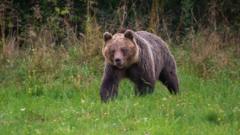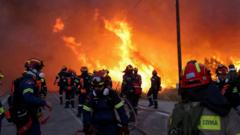In light of a recent bear attack that claimed a man's life, Slovakia's government has decided to cull approximately 350 brown bears. The action comes amidst increasing concerns over human encounters with the species, leading to a state of emergency across vast areas of the country.
Slovakia Agrees to Cull 350 Bears Amid Rising Human Encounters

Slovakia Agrees to Cull 350 Bears Amid Rising Human Encounters
The Slovak government extends its state of emergency to control the rising bear population following a fatal attack.
Following the tragic death of a 59-year-old man near Detva, Prime Minister Robert Fico's administration confirmed a plan to significantly reduce the bear population across 55 of Slovakia's 79 districts. The directive, announced after a cabinet meeting, permits the shooting of nearly a quarter of the estimated 1,300 brown bears inhabiting the region. "We can't live in a country where people are afraid to go into the woods," Fico stated.
The government had already relaxed hunting regulations regarding bears previously, allowing them to be killed if they ventured too close to human settlements. Reports indicate that before this announcement, 93 bears had already been culled in a bid to alleviate the perceived threat. However, this new initiative has drawn sharp criticism from conservationists who argue that it violates international wildlife preservation obligations.
Ecologist Michal Wiezek contended that the government's actions were misguided and termed the cull "absurd." He emphasized that thousands of bear encounters do not result in attacks every year, and he expressed hope that the European Commission would intervene against the proposed mass culling.
The decision follows a series of concerning incidents involving human-bear interactions, including a recent attack where a Belarusian woman lost her life after being pursued by a bear. Videos of bears roaming through populated areas have also raised alarm.
As the issue grows politically contentious, Environment Minister Tomas Taraba noted that while the bear population stands at 1,300, a target of 800 bears would suffice for balance. Experts, however, dispute claims of an excessive population, maintaining that bear numbers are stable at roughly 1,270 individuals. Bears are prevalent throughout the Carpathian mountain range, raising ongoing concerns about human-wildlife cohabitation in Slovakia.
The government had already relaxed hunting regulations regarding bears previously, allowing them to be killed if they ventured too close to human settlements. Reports indicate that before this announcement, 93 bears had already been culled in a bid to alleviate the perceived threat. However, this new initiative has drawn sharp criticism from conservationists who argue that it violates international wildlife preservation obligations.
Ecologist Michal Wiezek contended that the government's actions were misguided and termed the cull "absurd." He emphasized that thousands of bear encounters do not result in attacks every year, and he expressed hope that the European Commission would intervene against the proposed mass culling.
The decision follows a series of concerning incidents involving human-bear interactions, including a recent attack where a Belarusian woman lost her life after being pursued by a bear. Videos of bears roaming through populated areas have also raised alarm.
As the issue grows politically contentious, Environment Minister Tomas Taraba noted that while the bear population stands at 1,300, a target of 800 bears would suffice for balance. Experts, however, dispute claims of an excessive population, maintaining that bear numbers are stable at roughly 1,270 individuals. Bears are prevalent throughout the Carpathian mountain range, raising ongoing concerns about human-wildlife cohabitation in Slovakia.






















